| Srl | Item |
| 1 |
ID:
168540


|
|
|
|
|
| Summary/Abstract |
The rulings of internationals courts are often reduced to “who won?,” but much more is at stake. Like other institutions, the World Trade Organization (WTO) offers rulings that balance legal discipline against political constraints. We argue that one way in which the WTO handles politically sensitive issues is by increasing the amount of affect in their rulings. In doing so, judges provide national governments with discursive resources to persuade their domestic audiences of the legitimacy of compliance. To test our expectations, we conduct a text analysis of all rulings rendered by the institution since 1995. Specifically, we find that more politically charged decisions, such as the ones concerning nonfiscal rather than fiscal aspects of national treatment claims, are explained in qualitatively different terms. We also find that, as an issue gets ruled on repeatedly, the amount of affect deployed progressively decreases. In sum, the WTO chooses its words strategically to persuade litigants, and their domestic audiences, of the legitimacy of compliance in politically fraught disputes.
|
|
|
|
|
|
|
|
|
|
|
|
|
|
|
|
| 2 |
ID:
192035


|
|
|
|
|
| Summary/Abstract |
How does moral language affect international bargaining? When countries rely on moral language to frame a disputed issue, they decrease the probability of peaceful compromise and increase the probability of the dispute escalating with military action. This language operates through two pathways. First, moral language prejudices domestic audiences against compromise over the disputed issue, thereby limiting the options available to negotiators during bargaining. Second, moral language prompts the dispute opponent to also utilize moral arguments to defend its position. The ensuing moral debate moralizes both sets of domestic audiences, consequently reducing opportunities for compromise and narrowing the bargaining range. Negotiated concessions then frustrate the bargaining opponent and elicit accusations of hypocrisy from domestic audiences for compromising on the principle at stake. This backlash triggers crises and pressures the government to stand firm on its previously principled (and uncompromising) position, increasing the probability of military escalation. An examination of the effects of moral language on negotiation breakdown and dispute escalation in the Falkland Islands/Islas Malvinas case probes the theory. The findings illustrate how moral language can shape a government's behavior far into the future, constraining its ability to broker a peaceful compromise.
|
|
|
|
|
|
|
|
|
|
|
|
|
|
|
|